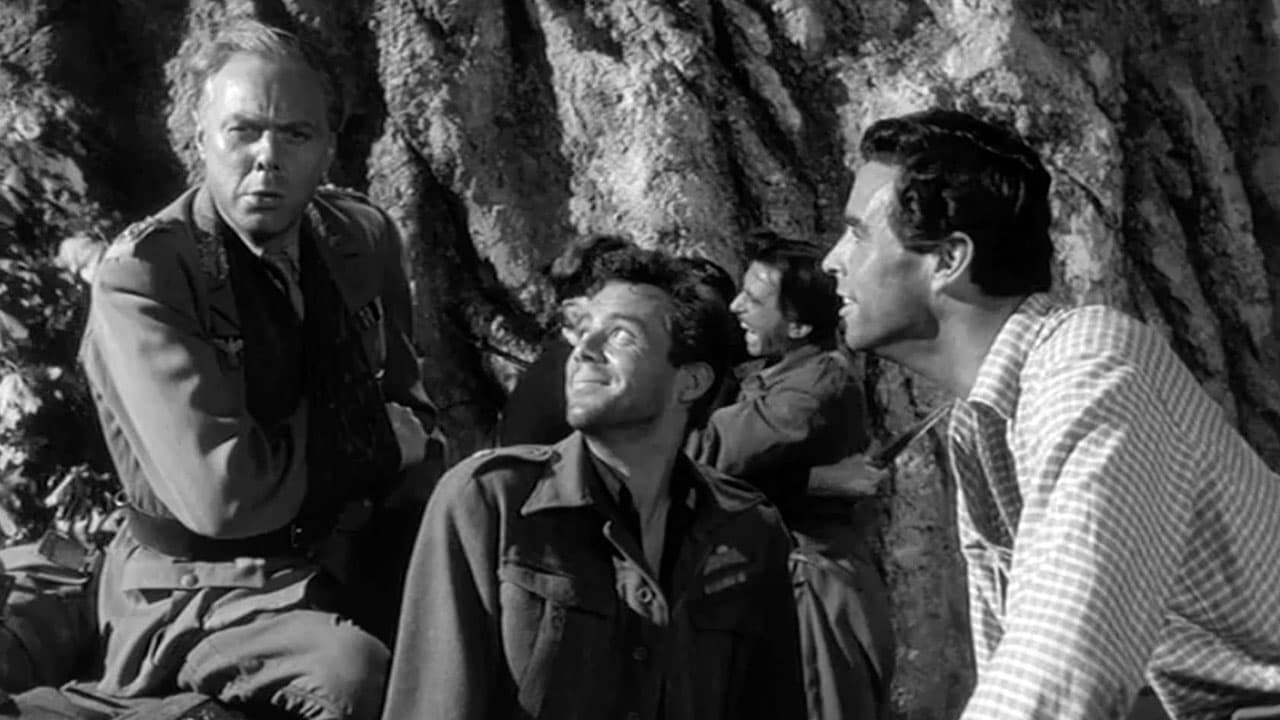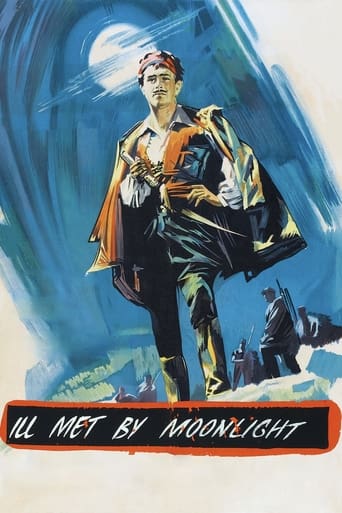



Dreadfully Boring
Bad Acting and worse Bad Screenplay
An absolute waste of money
The plot isn't so bad, but the pace of storytelling is too slow which makes people bored. Certain moments are so obvious and unnecessary for the main plot. I would've fast-forwarded those moments if it was an online streaming. The ending looks like implying a sequel, not sure if this movie will get one
View More"Ill Met by Moonlight," aka, "Night Ambush" is an unusual World War II film. It's one of many films about a special mission during the war, and it's one of many films about resistance and the underground. But, with both of these elements it also has some other less common aspects. First, it has the kidnapping of a German two-star general. Second, it's a rare look at the Greek underground in World War II. Third, it's about the widespread Greek resistance to German rule. This was the first such civilian resistance that Nazi Germany met in its conquests to that time. And, fourth, it's about a unique network that was established and operating during that time. That network included a thousand or more Greek soldiers, 500 British soldiers, and hundreds of Cretan civilians. The military were men who couldn't be evacuated in time, and who weren't among those captured as the Allies were overrun by the Germans in 1941. The Cretan people hid these men in mountain hamlets and villages around the island. With the Cretan resistance fighters, this lot formed a loosely organized underground. The movie doesn't show it but alludes to the formidable hindrance the network was to the Germans. By clandestine radio, it kept in touch with British command in Egypt. All of this makes for a most interesting wartime drama. It's not one of combat action, or even much resistance fighting. The killing that takes place is off screen and only alluded to. This is a movie about a calculated and well carried out ambush, kidnapping and flight from the enemy. The flight is aided by the natural mountainous terrain of Crete, and the collaboration with and support from people of the local villages and hamlets. Some reviewers take exception to the almost cavalier attitude or persona of the lead characters, especially Dirk Bogarde, as Major Patrick Fermor. He is known to the local Cretans, and the Nazi secret police, as Philedem. Most of the British leaders have that sort of carefree air about them as well. They seem to mirror the easy-going, carefree demeanor and attitudes of the Cretans themselves. As this movie shows, they could move about quite easily without German detection. They knew their land and its rugged terrain that the enemy did not know. So, who is to say that it wasn't something like that? With advisers for the film and the source material, it's likely that life was like that for those people then and there. The story is about a true event, based on a book, "Ill Met by Moonlight." That was a wartime diary of W. Stanley Moss's service in Crete. The original film title is the same as that of the book. It was renamed "Night Ambush" on release in America, and the film was cut by more than 10 minutes. I saw the original 104-minute British version. David Oxley plays Moss. Major Fermor requested his assignment for the 1944 mission to kidnap Major General Kreipe (played by Marius Goring). Kreipe commands 30,000 Germans on the island. That includes a paratrooper division that was the main assault force for the Germans in taking the island. So, the Brits now want to kidnap the Kreipe to humiliate the Germans and boost Allied morale. The operation was planned by British intelligence and carried out by the mixed underground. This may be one of those instances when it was more difficult to shoot a movie in a place than to carry out a war there. In 1957, the roadway system in Crete probably did not yet lend itself to the movement of huge film crews and equipment to mountainous areas for filming. So, this film was shot instead in similar terrain that was more easily accessible. The mountain scenes were shot in the Maritime Alps of Italy and France. The coastal scenes were shot along uninhabited and rugged spots that could still be found in 1957 along the French Riviera. This is an excellent movie. It's a deserved testimonial to the Cretan people. And, it's a nice story of a little-known highly successful Allied coup during WW II. It should be in any serious World War II film collection. For those interested in history, here's a little more that the film doesn't cover. The German invasion of Crete was called "Operation Mercury." It was the first large airborne assault in history. It was also the first time German troops met with mass resistance from a civilian population. The German parachute had only one riser, so it couldn't be controlled. And, the German jumped without their rifles which were dropped separately in bundles. Before many could get to their weapons, they were met by the Allied underground and the civilians. The latter were armed mostly with pitchforks, sledgehammers and other crude weapons. But they exacted a huge toll on the Germans. As a result, Hitler forbad future paratrooper assaults in the war. The Americans and British had far superior chutes, and they jumped with their weapons. So, the Allies had many successful airborne assaults during the war.After capturing Crete, the Germans carried out widespread reprisals against the civilians. Between June 2, 1941, and August of 1944, more than 1,000 Cretans were killed in large shootings by firing squads. Homes were looted and villages were destroyed. German generals Bruno Brauer and Friedrich-Wilhelm Muller ("The Butcher of Crete") were the commanders who ordered most of these reprisals. After the war, both were tried for war crimes and executed.
View MoreAdmittedly, had I seen this film when it came out, then I probably would have given it an 8 instead of a 6. But looking at it from an older point of view over 50 years later, I was really disappointed.There are three categories of groups involved: The British, who have great plans to capture a German general and really believe they can drive through 22 German checkpoints with the General having a fit on the floor of the car without being stopped. They have no real plan, no communication system and seem to think the whole thing is "jolly good fun." Then we have the Greeks, who don't really understand that the whole thing is probably going to cause the SS troops to wipe out a few mountain villages in retaliation. They have nothing better to do than run around laughing and shouting, shaking hands and kissing everybody in sight. So instead of informing the group that about 500 German soldiers are just coming round the corner, it's better to greet long lost friends, before passing on the information. Top gag is of course having a drunken party in a house in the village in the night with a British officer in uniform eating a sheep's head at a table in the middle of the room. The place is filled with singing and dancing, the door isn't locked, they have no sentry .... Really makes the Greeks look completely incompetent and stupid. To say nothing of the British.And last but not least we have the Germans, who don't even bother to stop the General's car, filled with strange bearded men not in German uniform, as it goes through one checkpoint after another. Really made the Germans look completely incompetent as well. Which they certainly weren't.If you like this type of film, it can be watched as a relic of the past, but don't expect anything like logic or a real-life story; I had expected much more drama and far less incompetence combined with unintended ridiculous comedy.
View MoreA group comprised of British soldiers stranded in Crete and local partisans decide to try something quite bold--kidnap the Nazi in charge of the island. Very little of the film actually involves the setup for the kidnapping and the actual event takes place somewhat uneventfully. The bulk of the film consists of a cross-country trek with the prisoner to try to spirit him out of the country.I decided to watch this film because I love the acting of Dirk Bogarde--plus, it being a Powell/Pressberger film didn't hurt. However, my overall impression was pretty unexceptional. Now I am not saying it's a bad film. The acting is fine and the direction seemed good as well. The problem, however, is that the story just never seemed all that interesting--even though it is based on the actual kidnapping of a German general by partisans during WWII. Competent but not enough to merit its being seen as anything more than a moderately interesting time-passer.
View MoreThis must be the worst film by Powell and Pressburger. Powell describes its failures so well (in his autobiography MILLION DOLLAR MOVIE, page 364) that one need not dwell on all the details. The biggest problem is the flip, arch, schoolboy attitude of the characters. Powell complains of Bogarde, and claims that his performance effected the others, but the script and direction can't escape blame. One of the strong moments in the much more interesting non-fiction book this is based on is when the author realizes that it's not just fun and games but all for real when the general's driver gets killed. This moment of realization is not in the film. The travel across the island with the general is much too long, and there is no evolution to the relationship between the general and his captors, which makes it very tedious. Goring is a weak-sister general; perhaps Powell's first choice of Curt Jurgens could have made a difference. But the greatest disappointment is the use of hackneyed dramatic structure, particularly in the final scenes. Whether Powell and Pressburger were good or bad, they were always original. But the sequence where the general tries to bribe the boy is so familiarly presented that every step of its structure is obvious from the start. Ditto the scene when the general leaves his hat, where we're given a clue in the dialogue that the British are on to this ruse. The scene is baldly inserted to give some sense of danger to the trek. Then there's the "I don't know Morse code, do you?" routine at the end, which is lazily resolved by Cusak coming up out of nowhere with no particular explanation. These, and other tired script devices are taken, unadorned, straight out of Saturday matinée westerns. I can forgive the lack of pacing, but not this. The photography is stunning, even though the "on-location" isn't Crete. And despite Powell's disparaging remarks about VistaVision, it really enhances the black and white.
View More